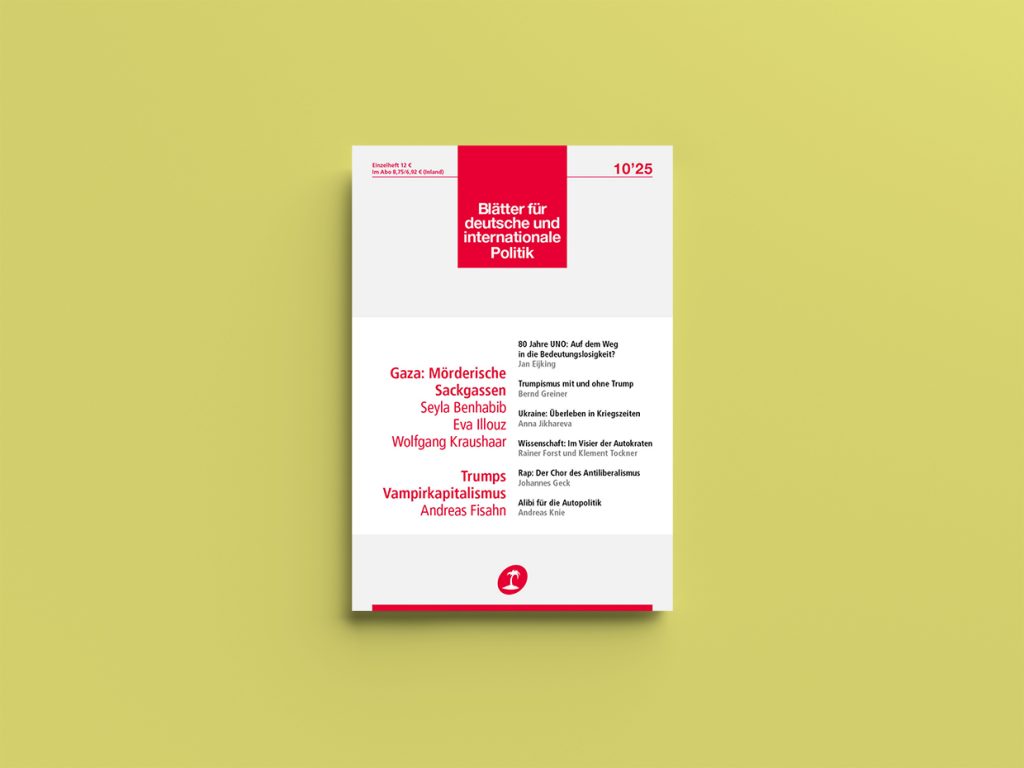
Israel has authorized a full military takeover of Gaza exactly twenty years after declaring it had ‘left’ the Strip. Disengagement failed because it was never designed to succeed – least of all on Palestinian terms.
6/2025
Gaza and the age of impunity; Islamism and leftwing anti-Zionism; dead-ends of Staatsräson; illiberal rap.
In Blätter, Seyla Benhabib writes that Israel’s war on Hamas reflects three significant shifts in international relations: first, protectionism, imperialism and expansionism replacing globalisation, particularly in the invasion – or threats of invasion – by Russia, the United States, China and Israel. This is often justified in ways reminiscent of the Lebensraum ideology of the early 20th century, with its ‘racialized and exclusionary vision of national identity’.
Second, the abandonment of multilateral human rights conventions for bilateral treaties. Throughout the Cold War, many multilateral agreements were reached and international institutions created. Our current moment is seeing the de-legitimisation and defunding of this infrastructure.
Third, state sovereignty is reconceived as state impunity, with international law consistently and openly defied for the sake of national interests or ‘security’. What is needed in the face of these shifts is a new political imagination that contests this throwback to 19th-century thinking and its unholy alliance with 21st-century military technology.

Rather than framing Israel as a colonialist state, argues Benhabib, there needs to be a recognition of the multiethnicity of Israeli society, which could from the basis for a truly pluralist future. ‘It is time to silence the sounds of war and to heal the wounds of the children of Gaza, and of all peoples in Israel/Palestine’.
Let our political imaginations soar: one state, two states, a confederation – international lawyers and political philosophers, refugee scholars and human rights experts will need to bring their good will and intelligence to bear upon the peoples of these lands, which includes Jews, Palestinians, Christians, Druze and Bedouin, so that they can build a future together.
Observing the rejoicing among leftists in western Europe and North America after the October 7th, Eva Illouz follows the trail of leftwing anti-Zionism back to Soviet antisemitism.
It was the Soviets that were the first to equate Zionism with imperialism and thus, logically, anti-imperialism with anti-Zionism. This ‘propaganda’ was taken up in the Arab world, where an antisemitic Islamism had already been informed by Nazism. The complexity of this mix of identifications and definitions of the enemy was not understood by the western Left. Since the victim could not also be the perpetrator, Illouz argues, the anti-imperialist Left simplified the story by equating Muslims with the oppressed proletariat and elevating their hostility towards Jews to a morally and politically sound revolutionary struggle.
This schema continues to play out today in ever more fantastical associations, such as that between the state of Israel and the destruction of the climate, as brought into play by the Marxist ecologist Andreas Malm. Illouz calls such associations ‘wandering structures’ that create identifications between disparate and even unrelated phenomena, in order to tell a simplistic story of good and evil. If the Left is to ‘survive as a humanist project’, she concludes, it must return to the ‘democratic virtues of complexity and truth’. Hope for the liberation of the Palestinian people lies here and not in a supposedly progressive hatred of the state of Israel.
Wolfgang Kraushaar draws up a list of contradictions that contribute to the paralysis on the part of the German public and government in face of the Israel-Hamas war. He begins with the stated aims of the Israeli operation: to destroy Hamas and to liberate the hostages. Each of these goals renders the other unattainable. Germany, meanwhile, set itself up for failure by declaring the protection of the state of Israel a matter of national interest. This in effect gave Israel carte blanche to behave as it will in the name of self-defence without risking opposition from Germany.
Appealing to the Holocaust as justification for Germany’s uncritical loyalty to Israel does a disservice to the victims of the Nazis; indeed it perverts their memory, Kraushaar argues. This does damage to our own value system: ‘Watching the negligent or deliberate killing of thousands upon thousands not only imperils our moral understanding of ourselves, it also puts to shame the norms enshrined in our own constitution.’
Israel’s AI-supported method of targeted killings, which include the destruction of entire buildings in which a suspected Hamas member lives with utter disregard for civilian casualties is a particularly egregious flaunting of rule of law as well as moral standards. The only way out of this barbarity, Kraushaar argues, is to vote Netanyahu out of office and bring about a political transformation of Israeli society.
Johannes Geck finds ideological overlap and cooperation between white supremacists and migrant artists in the German gangster rap scene. Rappers such as Haftbefehl, Cashmo or Kollegah, who are streamed in the millions in Germany, often fantasise in their lyrics about destroying the state and its representatives, killing the Jews that are allegedly running everything, and banding together as men to degrade women.
Whether the pure blood that is celebrated is ‘Germanic’ or a migrant ethnicity becomes almost irrelevant in the eyes of the artists and their fans. The shared animosity towards the liberal state and its perceived elitist culture, LGBTQ, feminism and so forth leads to lyrics such as: ‘And believe me when I say that most of my Kanaks feel the same way. It’s the Germans who hate me, and Mehmet who greets me.’ When the author of these lines, Cashmo, recently co-recorded a track with Haftbefehl, who has Turkish roots and celebrates his migrant identity, there was really no reason to be surprised.
Review by Millay Hyatt
Published 22 October 2025
Original in English
First published by Eurozine
© Eurozine
PDF/PRINTSubscribe to know what’s worth thinking about.

Israel has authorized a full military takeover of Gaza exactly twenty years after declaring it had ‘left’ the Strip. Disengagement failed because it was never designed to succeed – least of all on Palestinian terms.

Veganism is rising in countries with the most meat-heavy diets, especially amongst the young. How did this change come about? Standard Time dives deep into the meat-free diet and how an agricultural transition could benefit farmers.